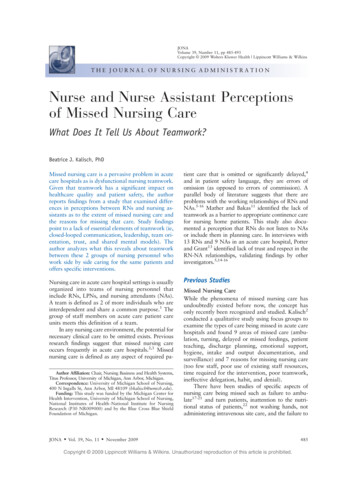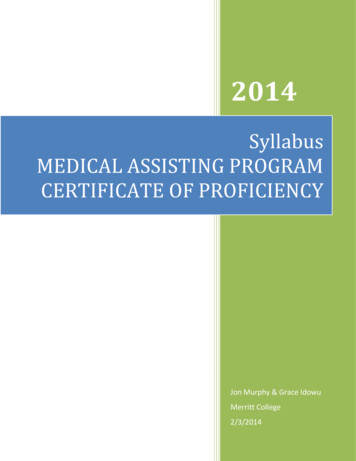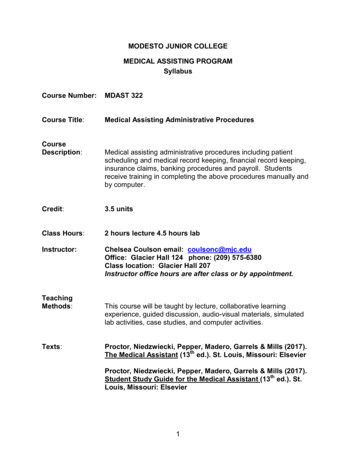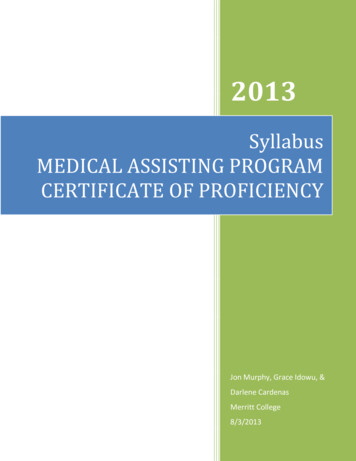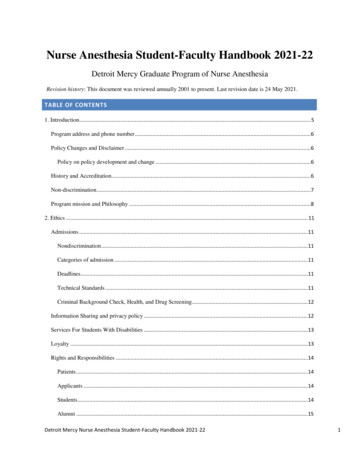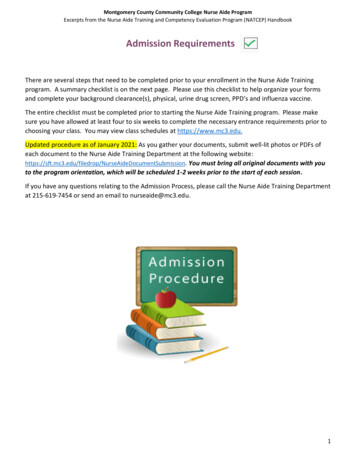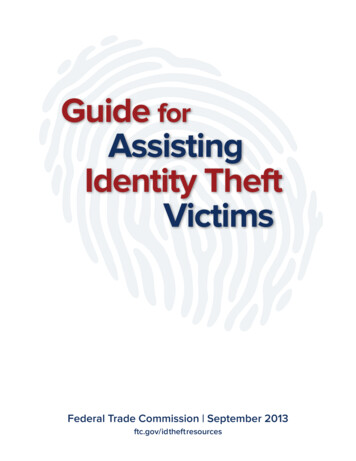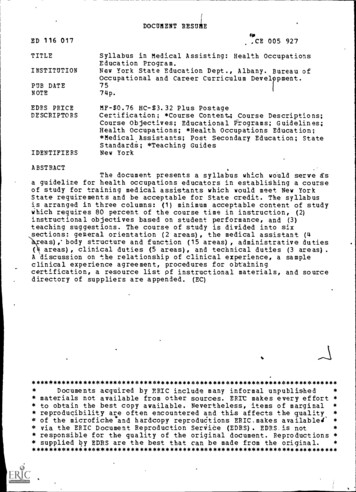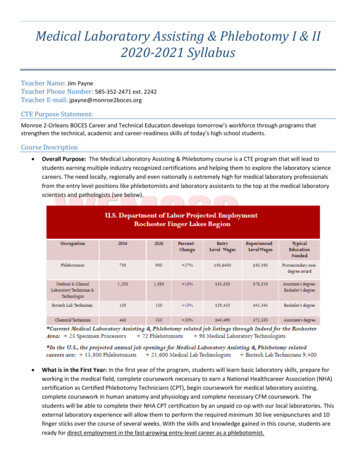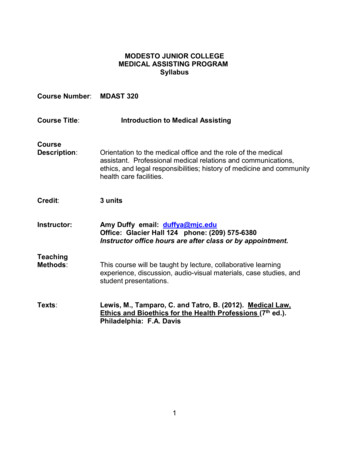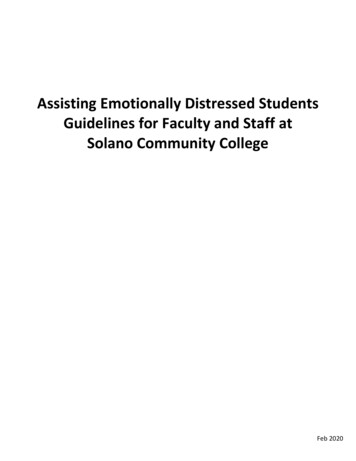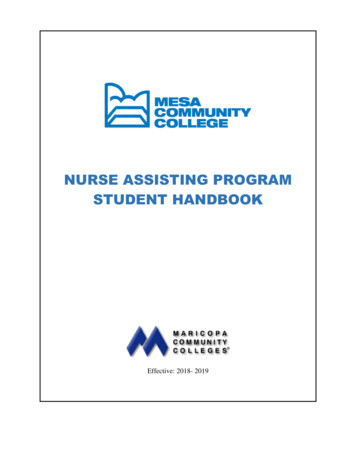
Transcription
NURSE ASSISTING PROGRAMSTUDENT HANDBOOKEffective: 2018- 2019
MARICOPA COMMUNITY COLLEGESNURSE ASSISTING PROGRAM STUDENT HANDBOOKTABLE OF .XIV.XV.XVI.GENERAL INFORMATION .Occupational InformationNurse Assistant CertificationVISION, MISSION AND PHILOSOPHY .PROGRAM INFORMATION .Nurse Assisting Program CompetenciesGrading and EvaluationNurse Assisting Program Clock HoursENROLLMENT/ATTENDANCE INFORMATION .College PoliciesSpecial CircumstancesCHANNELS OF COMMUNICATION .Problem ResolutionInstructional Grievance ProcessPROFESSIONAL APPEARANCE .INFORMATION TECHNOLOGY .Criteria for Use of Mobile DevicesSocial NetworkingHEALTH INSURANCE PORTABILITY AND ACCOUNTABILITY ACT (HIPPA) .HEALTH AND SAFETY GUIDELINES Health and Safety ES FOR STUDENT CONDUCT Student Expectation in Reporting Unprofessional ConductProfessional BoundariesStudent & FacultyStudent & ClientsStandards of Professional ConductDISCIPLINARY GUIDELINES .Zero Tolerance PolicyAcademic MisconductUnsafe or Unethical ConductESSENTIAL SKILLS AND FUNCTIONAL ABILITIES FOR NURSE ASSISTING PROGRAM STUDENTS .GUIDELINES REGARDING EXPOSURE TO BODY FLUIDS .Standard PrecautionsExposure GuidelinesDRUG SCREENING PROCEDURE .Drug Screening GuidelinesDrug Screening “For Cause” TestingReadmission Guidelines Related to Positive “For Cause” TestingSTUDENT RECORD MAINTENANCE .CLASSROOM AND CLINICAL INSTRUCTION .Page2STUDENT ACKNOWLEDGEMENTS (STUDENT COPIES) PAGE346810121315161821242729333335This handbook prescribes standards of conduct for students enrolled in the Nurse Assisting program in the Maricopa Community Colleges. The standards are in addition tothose prescribed for students under Maricopa County Community College District policies and administrative regulations. Violation of any such standard may serve as groundsfor program dismissal, suspension, and/or other disciplinary actions according to the student handbook of the college. Maricopa Community Colleges reserves the right tochange, without notice, any materials, information, curriculum, requirements, and regulations in this publication.
MARICOPA COMMUNITY COLLEGESNURSE ASSISTING PROGRAM STUDENT HANDBOOKI.GENERAL INFORMATIONMesa Community College (MCC) is accredited by the Higher Learning Commission(HLC). The Mesa Community College Nurse Assisting program is approved by the ArizonaState Board of Nursing, 1740 W. Adams St., Suite 2000, Phoenix, AZ 85007, Phone:602.771.7800, FAX 602.771.7788.A. Occupational InformationNursing assistants perform routine tasks in the general care of hospital, clinic, andnursing home patients. Nursing assistants are important members of the health careteam. They work directly under the supervision of practical and registered nurses toassist licensed staff in providing quality nursing care to the client. Typical patient careduties include bathing and dressing, assisting with personal hygiene, taking vital signs,answering call lights, transporting, servicing and collecting food trays, and feedingpatients. The nursing assistant role is one of a series of possible steps on a career ladderin the health care field, including licensed practical or registered nurse.B. Nurse Assistant CertificationUpon satisfactory completion of the Nurse Assisting course (NUR158), the student iseligible to receive a Certificate of Completion from MCC. Each student must apply forthe Certificate of Completion by the specific date of graduation checkout,approximately 6-8 weeks before the end of the program. The graduate is eligible toapply for the certifying exam approved by the Arizona State Board of Nursing. ACertified Nursing Assistant (CNA) may choose to work in health care or continue topursue educational opportunities in nursing.Information about the Arizona State Board of Nursing application process is available athttp://www.azbn.gov. The certifying exam is administered by state certified evaluatorsand students may schedule the exam at local testing centers. The fee for this exam isapproximately 118 (subject to change) and is payable to the state evaluators.A Level One Fingerprint Clearance Card is required for admission into the NurseAssisting Program. The DPS fingerprint card is required for enrollment in nursingclasses to ensure the college meets the requirements for state certification.Page3Applicants for certification in Arizona must provide evidence of citizenship ornationality. Questions about eligibility for licensure and the documents requiredshowing eligibility to apply for certification should be directed to the Arizona StateBoard of Nursing (1740 W. Adams St., Suite 2000, Phoenix, AZ 85007, Phone:602.771.7800, FAX 602.771.7788).
MARICOPA COMMUNITY COLLEGESNURSE ASSISTING PROGRAM STUDENT HANDBOOKII.VISION, MISSION AND PHILOSOPHYVision: The vision for the Mesa Community College’s Nurse Assisting program is toeducate health care providers to become caring, sensitive nursing assistants who valuelifelong learning, and who practice safely and responsibly with knowledge, integrity, andrespect for human dignity.Mission: It is the mission of the MCC Nurse Assisting program to prepare providers ofnursing care who practice according to the core values and vision of the Nurse Assistingprogram who will become productive members of the diverse health care community. Toaccomplish its mission, the MCC Nurse Assisting program provides student-centeredlearning experiences and professional faculty who support adult learning principles andpractices. To ensure an optimal clinical learning experience for our students, we activelydevelop and maintain collaborative partnerships with our diverse health care community.Philosophy: Mesa’s Nurse Assisting program is committed to the core values of caring,critical thinking, holism, nursing role development, safe practice, information management,and technology. These values focus on key stakeholders of health care: clients, colleagues,and the community. The acquisition of these six core values is essential to the foundation ofthe practice of the art and science of nursing.A. Caring:The core value of Caring is characterized by genuine, warm, and sensitive nursing careproviders who demonstrate empathy, respect for self and colleagues, and health selfesteem. These providers use positive communication skills that are growth producingfor clients and colleagues.B. Critical Thinking:The core value of Critical Thinking is characterized by providers of nursing care whopractice self-reflective, rational reasoning within their scope of practice. Theseproviders are open-minded and creative and promptly report questions or problems totheir superior.C. Holism:The core value of Holism is characterized by non-judgmental providers of nursing care.They understand and they accept, respect, and are sensitive to the spirituality anddiversity of clients and those communities in which they live. These providers arerestorers and promoters of health for clients across the life span. They understand thewellness-to-illness continuum and help patients achieve their highest state of wellness.Page4D. Nursing Role Development:The core value of Nursing Role Development is characterized by accountable providersof nursing care who seek, as their ideal, ethical and moral practice. These providers areclient advocates who exhibit assertive behaviors as needed for patient advocacy. They
MARICOPA COMMUNITY COLLEGESNURSE ASSISTING PROGRAM STUDENT HANDBOOKdemonstrate adaptability and flexibility in the dynamic health care environments andare productive team members. At all times, they demonstrate the images and presence ofa nursing assistant who is committed to the core values.E. Safe Practice:The core value of Safe Practice is characterized by responsible providers of nursing carewho demonstrate clinical excellence and competence through the provision of qualitypatient care. These providers practice legally and ethically and seek positive clientoutcomes.F. Information Management and Technology:Page5The core value of Information Management and Technology is characterized bydemonstration and understanding of basic data collection tools such as the medicalrecord, shift report, and the use of electronic equipment. These providers value the useof electronic devices to enhance the safety and efficiency of patient care. These providersalso understand and utilize a variety of information sources such as online databases,hand-held computers, and professional journals to enhance outcomes.
MARICOPA COMMUNITY COLLEGESNURSE ASSISTING PROGRAM STUDENT HANDBOOKIII.PROGRAM INFORMATIONA. Nurse Assisting Program Competencies1. Describe the role of the nurse assistant in caring for elderly clients and those withalterations in health.2. Describe the roles and responsibilities of the nurse assistant related to ethical andlegal standards of the profession.3. Use simple problem-solving skills when giving care to elderly clients and clientswith alterations in health.4. Describe professional communication skills specific to the nurse assistant as amember of the health care team.5. Describe select nurse-assisting interventions designed to meet the holistic needs ofclients.6. Describe basic nurse assisting skills to ensure a safe environment and personalsafety for the client.7. Describe specific caring behaviors that are important when caring for clients andcommunication with members of the health care team.8. Describe the signs and symptoms of specific diseases, and the conditions andalterations in client behavior.9. Apply the principles of nutrition and fluid balance to client care.10. Describe the special care needs of elder clients in the acute and long-term caresettings.11. Describe the basic skills and procedures needed for clients in emergencies.12. Perform basic therapeutic maintenance and preventative interventions identified inthe client’s plan of care, appropriate to the nurse assistant role.13. Function as a member of the health care team within the health care facility.14. Demonstrate behaviors that are in accordance with accepted standards of practiceand ethical guidelines, within the role of the nurse assistant.Page615. Demonstrate simple problem solving skills to provide care to clients with alterationsin health, under the direction of the nursing staff.16. Demonstrate appropriate communication skills with clients with alterations inhealth.
MARICOPA COMMUNITY COLLEGESNURSE ASSISTING PROGRAM STUDENT HANDBOOK17. Demonstrate caring behaviors when interacting with clients in acute and long-termagencies.18. Demonstrate skills necessary to ensure a safe environment and protection of theclient.19. Implement nursing assistant skills that relate to basic and holistic client needs.20. Communicate the client’s response to appropriate nursing personnel, throughrecording and reporting.21. Apply common medical terms used for the simple organization of the body, majororgans, and medical abbreviations.B. Grading and Evaluation1. Methods of evaluation for grade calculation will be detailed in the course syllabus.2. Student must achieve a minimum grade of 76% on the final exam to pass NUR158.No rounding will occur.3. The Nurse Assisting (NUR158) course utilizes the following grading scale:a. GRADING SCALE (Theory only, cumulative)1)2)3)4)5)92-100%84-91%76-83%68-75%67% or below ABCDF4. Students will receive written notification of clinical probation if performance isunsatisfactory.5. Students are responsible to track their course grade. Students will receive writtennotification of academic probation if cumulative course grade is less than 76%.C. Nurse Assisting Program Clock HoursPage7NUR158 6 creditsTheory/Classroom InstructionNursing Laboratory InstructionClinical PracticeTotal HoursClock Hours604248150
MARICOPA COMMUNITY COLLEGESNURSE ASSISTING PROGRAM STUDENT HANDBOOKIV.ENROLLMENT/ATTENDANCE INFORMATIONA. College Policies1. A student may be withdrawn from the program based on the inability to be placedin a clinical facility due to student conduct.2. Students must be registered for the class in order to attend.3. Student will be held to Maricopa County Community College District (MCCCD)policies and procedures related to attendance (see college catalog, AdministrativeRegulations, 2.3.2). “Attendance requirements are determined by the courseinstructor. Students who do not meet the attendance requirements as determinedby the course instructor may be withdrawn.”4. Students who fail to attend the first class meeting must contact the instructor beforethe first class meeting regarding the absence and may, at the option of the instructor,be withdrawn. Students must meet the attendance requirement as documented inthe course syllabus.5. Students are expected to attend all class and clinical experiences necessary to meetcriteria of the course. There are no provisions for make-up clinical absences.6. Students are responsible to notify the Office of Admissions and Records forwithdrawal when they discontinue studies in a course at the college.B. Special CircumstancesThere are no provisions for an “excused absence” outside the following list as describedin the college policies (see college catalog). All requests for an excused absence mustmeet the college policy and the request is to be sent directly to the primary courseinstructor.Official absences, as per the college handbook, are those that occur when students areinvolved in an official activity of the college. Students must present the Official AbsenceVerification form to the instructor before the absence. Prior arrangements must be madewith each instructor for makeup work. If prior arrangements have been made, thestudent will not be penalized. In cases of official or excused absences, all NurseAssisting program students must meet minimum classroom and clinical hours ofattendance as noted in course syllabus.1. Jury Duty and subpoenas: Appropriate documentation required.Page82. Family Emergency: In the event of death of an immediate family member, absencesmay be approved by the course instructor. The student must meet the attendancerequirements of the course syllabus.
MARICOPA COMMUNITY COLLEGESNURSE ASSISTING PROGRAM STUDENT HANDBOOKPage93. Religious Holidays: At least one week before the holiday, the student must provideto the course instructor a written statement including the date of the holiday and areason why class attendance is impossible.
MARICOPA COMMUNITY COLLEGESNURSE ASSISTING PROGRAM STUDENT HANDBOOKV.CHANNELS OF COMMUNICATIONA. Problem ResolutionThere is an expectation of mutual respect between instructors and students. Studentsare encouraged to ask questions, clarify issues with their instructor, and seek assistanceas needed when issues arise. Issues are often resolved by direct communication betweenthe faculty member and the student. If the issue is not resolved, the student shouldsubmit a request to meet with the NA Program Coordinator along with a description ofthe issue. The NA Program Coordinator will schedule a meeting with the student andthe instructor to discuss the concern.If the issue is not resolved after meeting with the NA Program Coordinator, the studentwho feels that he or she has been treated unfairly or unjustly by an instructor, withregard to an academic process such as grading or testing, has the right to appealaccording to approved procedures. The instructional grievance process for grades mustbe initiated no later than sixty (60) calendar days from the date the grade was issued.See: gs/appendices/students/s-6B. Instructional Grievance Process1. Discuss the issue with the faculty member involved. This conference should berequested by the student within fifteen (15) working days from the time the studentknew or reasonably should have known about the unfair or unjust treatment.2. If, within ten (10) working days of the request for the conference with the facultymember, the problem is not resolved or the faculty member has been unable to meetwith the student, the student may continue the process by filing a writtencomplaint with the department/division chairperson and appropriate administrativeofficer at the college/center. This written complaint must be filed within ten (10)working days following the previous deadline. The written complaint will be givento the faculty member five (5) days before any official meetings are convened.Page103. Upon receipt of a written complaint, the department/division chair or appropriatecollege administrative officer will work with the parties in an attempt to resolve theconflict. The faculty member may ask that the college faculty senate president be inattendance. Every attempt will be made to maintain confidentiality during thisprocess. A faculty member will not be required to respond to a complaint which isnot in writing and which, when appropriate, did not have specific documentationincluding dates, times, materials, etc. The written complaint will be made availableto the faculty member.4. If the grievance is not resolved at this level within ten (10) working days, thestudent should forward to the Vice President of Academic Affairs or designee, a
MARICOPA COMMUNITY COLLEGESNURSE ASSISTING PROGRAM STUDENT HANDBOOKcopy of the original written complaint with an explanation regarding action takenat each prior level. The Vice President or designee will meet with the student,faculty member, the college Faculty Senate President (if requested by the facultymember), and Department/Division Chairperson and attempt to resolve the issues.This level will be the final step in any grievance process regarding grades.Page115. If the grievance, other than those concerning grades, is not resolved by the VicePresident of Academic Affairs or designee, it may be forwarded in writing by thestudent to the College President for final resolution. The College President ordesignee will expedite a timely examination of the issues and will issue a finalwritten determination in the grievance process.
MARICOPA COMMUNITY COLLEGESNURSE ASSISTING PROGRAM STUDENT HANDBOOKVI.PROFESSIONAL APPEARANCEAll students are expected to present themselves in a professional manner at all times whileenrolled in the Nurse Assisting program. Students must be in compliance with thefollowing professional dress code guidelines to remain in the clinical setting.A. Students are to wear the official Nurse Assisting program uniform in all clinical settingsunless setting or agency requires other clinical attire. Picture ID badge and facilitybadge, if required, will be worn on the upper left side of the uniform at all times. Allstudents must have their Level One Fingerprint Clearance Card while in the clinicalsetting.B. No jewelry is to be worn with the uniform except wedding rings, engagement rings, onepair of small post earrings, and wristwatch. Necklaces must be kept under clothing andnot visible.C. No visible facial or body piercing jewelry or tattoos. No objects of any type may be wornon the tongue. If necessary, a small beige bandage is permitted to cover visible piercing.D. Hair must be clean, worn off the collar and back from the face and not higher than 2inches above the head while in uniform. Makeup should be subtle and in good taste.Neatly trimmed beards and mustaches are permitted.E. No chewing gum wh
Mesa Community College (MCC) is accredited by the Higher Learning Commission (HLC). The Mesa Community College Nurse Assisting program is approved by the Arizona State Board of Nursing, 1740 W. Adams St., Suite 2000, Phoenix, AZ 85007, Phone: 60
